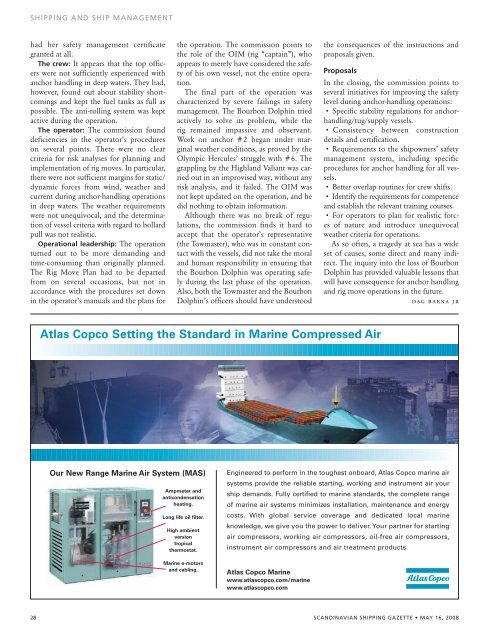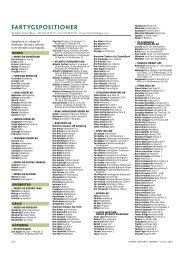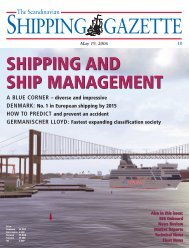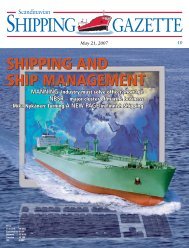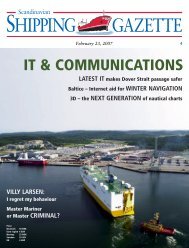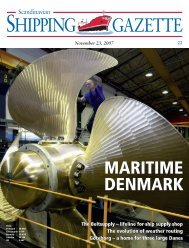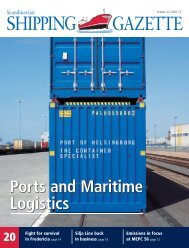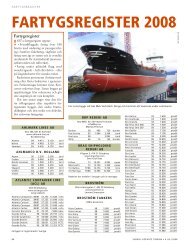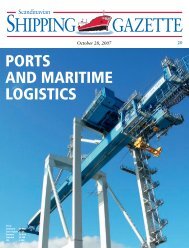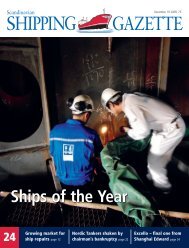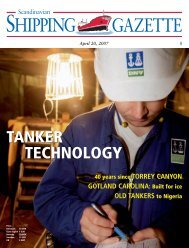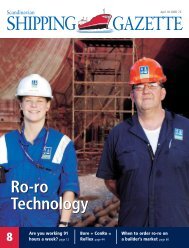SSG No 10 - Shipgaz
SSG No 10 - Shipgaz
SSG No 10 - Shipgaz
- TAGS
- shipgaz
- shipgaz.com
You also want an ePaper? Increase the reach of your titles
YUMPU automatically turns print PDFs into web optimized ePapers that Google loves.
SHIPPING AND SHIP MANAGEMENT<br />
had her safety management certificate<br />
granted at all.<br />
The crew: It appears that the top officers<br />
were not sufficiently experienced with<br />
anchor handling in deep waters. They had,<br />
however, found out about stability shortcomings<br />
and kept the fuel tanks as full as<br />
possible. The anti-rolling system was kept<br />
active during the operation.<br />
The operator: The commission found<br />
deficiencies in the operator’s procedures<br />
on several points. There were no clear<br />
criteria for risk analyses for planning and<br />
implementation of rig moves. In particular,<br />
there were not sufficient margins for static/<br />
dynamic forces from wind, weather and<br />
current during anchor-handling operations<br />
in deep waters. The weather requirements<br />
were not unequivocal, and the determination<br />
of vessel criteria with regard to bollard<br />
pull was not realistic.<br />
Operational leadership: The operation<br />
turned out to be more demanding and<br />
time-consuming than originally planned.<br />
The Rig Move Plan had to be departed<br />
from on several occasions, but not in<br />
accordance with the procedures set down<br />
in the operator’s manuals and the plans for<br />
the operation. The commission points to<br />
the role of the OIM (rig “captain”), who<br />
appears to merely have considered the safety<br />
of his own vessel, not the entire operation.<br />
The final part of the operation was<br />
characterized by severe failings in safety<br />
management. The Bourbon Dolphin tried<br />
actively to solve its problem, while the<br />
rig remained impassive and observant.<br />
Work on anchor # 2 began under marginal<br />
weather conditions, as proved by the<br />
Olympic Hercules’ struggle with # 6. The<br />
grappling by the Highland Valiant was carried<br />
out in an improvised way, without any<br />
risk analysis, and it failed. The OIM was<br />
not kept updated on the operation, and he<br />
did nothing to obtain information.<br />
Although there was no break of regulations,<br />
the commission finds it hard to<br />
accept that the operator’s representative<br />
(the Towmaster), who was in constant contact<br />
with the vessels, did not take the moral<br />
and human responsibility in ensuring that<br />
the Bourbon Dolphin was operating safely<br />
during the last phase of the operation.<br />
Also, both the Towmaster and the Bourbon<br />
Dolphin’s officers should have understood<br />
Atlas Copco Setting the Standard in Marine Compressed Air<br />
Our New Range Marine Air System (MAS)<br />
Ampmeter and<br />
anticondensation<br />
heating.<br />
Long life oil filter.<br />
High ambient<br />
version<br />
tropical<br />
thermostat.<br />
Marine e-motors<br />
and cabling.<br />
the consequences of the instructions and<br />
proposals given.<br />
Proposals<br />
In the closing, the commission points to<br />
several initiatives for improving the safety<br />
level during anchor-handling operations:<br />
• Specific stability regulations for anchorhandling/tug/supply<br />
vessels.<br />
• Consistency between construction<br />
details and certification.<br />
• Requirements to the shipowners’ safety<br />
management system, including specific<br />
procedures for anchor handling for all vessels.<br />
• Better overlap routines for crew shifts.<br />
• Identify the requirements for competence<br />
and establish the relevant training courses.<br />
• For operators to plan for realistic forces<br />
of nature and introduce unequivocal<br />
weather criteria for operations.<br />
As so often, a tragedy at sea has a wide<br />
set of causes, some direct and many indirect.<br />
The inquiry into the loss of Bourbon<br />
Dolphin has provided valuable lessons that<br />
will have consequence for anchor handling<br />
and rig move operations in the future.<br />
dag bakka jr<br />
Engineered to perform in the toughest onboard, Atlas Copco marine air<br />
systems provide the reliable starting, working and instrument air your<br />
ship demands. Fully certified to marine standards, the complete range<br />
of marine air systems minimizes installation, maintenance and energy<br />
costs. With global service coverage and dedicated local marine<br />
knowledge, we give you the power to deliver. Your partner for starting<br />
air compressors, working air compressors, oil-free air compressors,<br />
instrument air compressors and air treatment products.<br />
Atlas Copco Marine<br />
www.atlascopco.com/marine<br />
www.atlascopco.com<br />
28 SCANDINAVIAN SHIPPING GAZETTE • MAY 16, 2008


